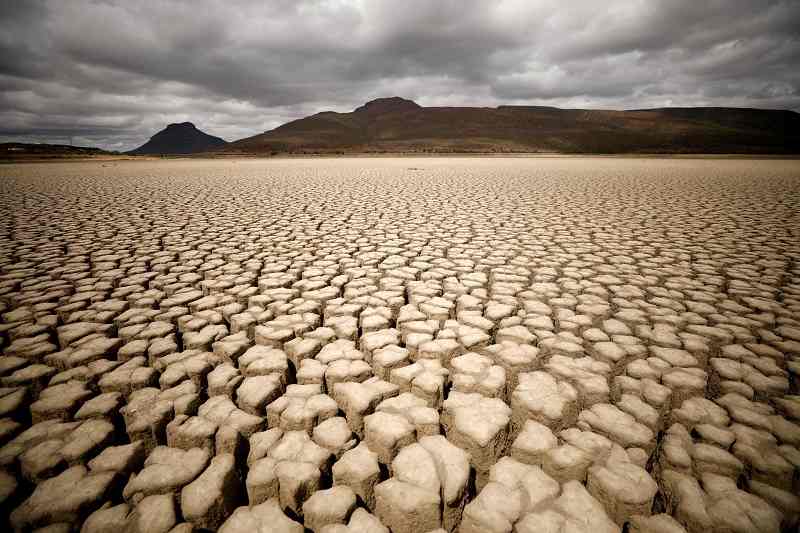
Clouds gather but produce no rain, as cracks are seen in dried mud near a municipal dam in drought-stricken Graaff-Reinet, South Africa, in November 2019.
22:02 JST, August 3, 2022
A scientific basis exists to calculate how much one country’s carbon emissions have damaged the economy of another, a study said on July 12 of a development it billed as a potential game-changer for climate litigation.
The research by U.S.-based Dartmouth College found that a small group of heavy polluters have caused trillions of dollars of economic losses due to warming caused by their emissions, with warmer and poorer Global South countries hit hardest.
The United States and China, as the world’s two leading emitters, caused global income losses of over $1.8 trillion each from 1990-2014, while Russia, India, and Brazil caused losses individually exceeding $500 billion each for the same years.
The analysis allows further breakdowns to show the damage done by a single emitter to another individual country’s economy among the sample of 143 countries for which data are available.
“This research provides legally valuable estimates of the financial damages individual nations have suffered due to other countries’ climate-changing activities,” said Justin Mankin, senior researcher of the study.
The analysis sampled 2 million possible values for each country-to-country interaction and used a supercomputer to crunch a total of 11 trillion values to quantify and address cause-and-effect uncertainties.
Warmer temperatures can cause economic losses for a country through various channels such as lowering agricultural yields or reducing labor productivity through heat stress. Conversely, for some cooler countries in the north, warming can raise output by boosting crop yields.
Thus, while U.S. territorial emissions cost Mexico a total $79.5 billion of lost gross domestic product (GDP) between 1990-2014, according to the analysis, their impact on Canada was a gain of $247.2 billion. Figures used are 2010 inflation-adjusted U.S. dollar values.
“The statement that it is possible and scientifically credible to link an individual actor to an individual tangible impact is a statement that has not been made robustly in previous work,” said study first author Christopher Callahan.
In the past two decades, the number of climate-related lawsuits has risen from barely a handful to well over a thousand. But these have largely targeted oil majors and other corporates rather than attempting to pin down the liability of a given nation-state.
Top Articles in Science & Nature
-

Japan Institute to Use Domestic Commercial Optical Lattice Clock to Set Japan Standard Time
-

iPS Treatments Pass Key Milestone, but Broader Applications Far from Guaranteed
-

Record 700 Startups to Gather at SusHi Tech Tokyo in April; Event Will Center on Themes Like Artificial Intelligence and Robotics
-

iPS Cell Products for Parkinson’s, Heart Disease OK’d for Commercialization by Japan Health Ministry Panel
-

Japan to Ban Use of Power Banks on Airplanes
JN ACCESS RANKING
-

Japan PM Takaichi’s Cabinet Resigns en Masse
-

Japan Institute to Use Domestic Commercial Optical Lattice Clock to Set Japan Standard Time
-

Israeli Ambassador to Japan Speaks about Japan’s Role in the Reconstruction of Gaza
-

Man Infected with Measles Reportedly Dined at Restaurant in Tokyo Station
-

Videos Plagiarized, Reposted with False Subtitles Claiming ‘Ryukyu Belongs to China’; Anti-China False Information Also Posted in Japan






















